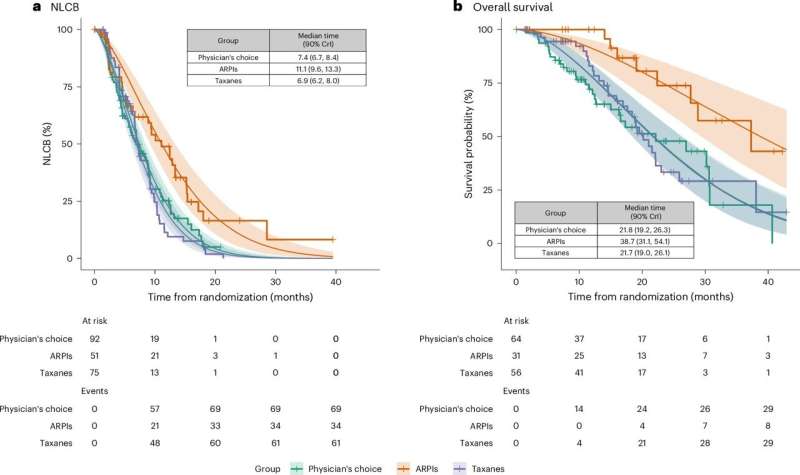This article has been reviewed according to Science X's editorial process and policies. Editors have highlighted the following attributes while ensuring the content's credibility:
fact-checked
peer-reviewed publication
trusted source
proofread
Precision therapy for metastatic prostate cancer offers improved survival

Men with metastatic castration-resistant prostate cancer should be treated primarily with second-generation hormone drugs, which offer better treatment response and longer life expectancy than chemotherapy. However, the effect depends on which mutations the patient's tumor carries. These findings are a result of the ProBio study, led by researchers at Karolinska Institutet in Sweden. The study is published in Nature Medicine.
Every year, about 2,500 men in Sweden are diagnosed with metastatic prostate cancer. Initially, all are treated with testosterone blockade to prevent testosterone from activating the androgen receptor, the gene that mainly fuels the growth of cancer cells.
Over time, the cancer cells develop resistance and become so-called castration-resistant. This requires the use of new drugs—usually chemotherapy or second-generation hormone drugs (abiraterone/enzalutamide) that inhibit the androgen receptor. These are called Androgen Receptor Pathway inhibitors, or ARPi.
Although these drugs have been available for over a decade, there is no direct comparison from a randomized trial until now.
Personalized treatment
"For the first time, we have compared these treatments with each other and also analyzed the DNA of the cancer cells to find out which drug that works best for different individuals," says Johan Lindberg, senior researcher at the Department of Medical Epidemiology and Biostatistics (MEB), Karolinska Institutet.
The bloodstream contains so-called cell-free DNA from cells that have died, something that happens all the time in healthy individuals and is perfectly normal. In patients with cancer, a fraction of the cell-free DNA originates from the cancer cells and is called circulating tumor DNA (ctDNA). By analyzing ctDNA, it is possible to see what changes, or mutations, are present in a person's tumor.
The ProBio study aims to use knowledge of the tumor's genetic signature to provide the best treatment. The idea is to be able to identify patients whose tumors are particularly sensitive or resistant to certain treatments through ongoing analyses.
"It creates a self-learning system to continuously improve treatment for men with metastatic prostate cancer," says Martin Eklund, Professor of Epidemiology in the same department. "We are also gathering knowledge about which regions of the genome are important in prostate cancer."
Longer life expectancy
The current sub-study included 193 patients with metastatic castration-resistant prostate cancer. They were randomly chosen to receive either chemotherapy or ARPi, which was compared to a control group where the doctor decided on the best treatment.
The ARPi group responded the longest to treatment (a median of 11.1 months compared with 6.9 for chemotherapy and 7.4 for the control group). Survival for the ARPi group was also significantly longer—a median of 38.7 months compared with 21.7 months and 21.8 months respectively.
The effectiveness of ARPi varied depending on the patient's genetic profile. For example, there was no significant difference between the treatments in the short term in patients whose tumors had mutations in the p53 gene, which occurs in about 45% of men with metastatic prostate cancer. However, data from the study suggest that this group may also have better survival if they receive ARPi rather than chemotherapy.
The best treatment
"Our study shows that it is possible to ensure that each patient receives the best treatment given the genetic profile of the tumor," says Henrik Grönberg, Professor of Cancer Epidemiology, MEB, Karolinska Institutet. "Everyone talks about precision medicine, but studies like ProBio are needed to understand how biomarkers can help patients."
ProBio involves researchers and doctors at 31 hospitals, 10 of which are in Sweden and the rest in Belgium, Norway and Switzerland.
More information: Bram De Laere et al, Androgen receptor pathway inhibitors and taxanes in metastatic prostate cancer: an outcome-adaptive randomized platform trial, Nature Medicine (2024). DOI: 10.1038/s41591-024-03204-2



















